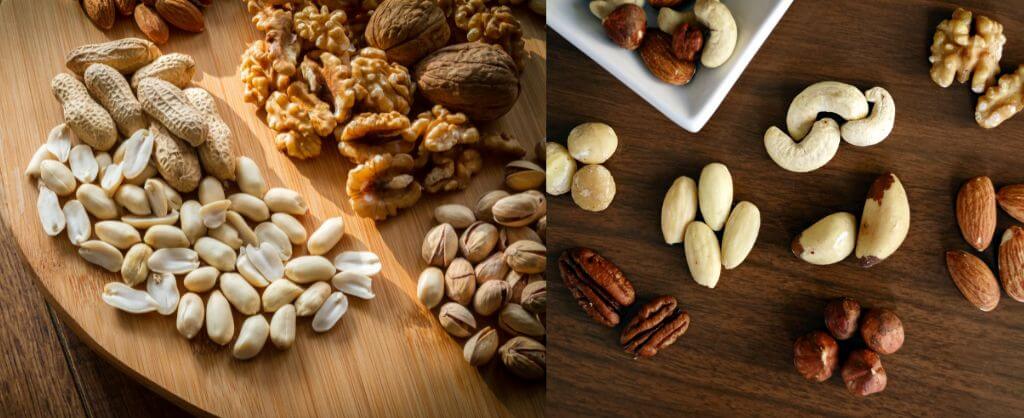Health Benefits of 10 Different Nut Varieties

Nuts have been cherished for centuries, not just for their scrumptious flavors but also for the incredible array of health benefits they bring to the table. These little powerhouses are bursting with essential nutrients, heart-healthy fats, and satisfying protein.
From almonds and walnuts to cashews and pistachios, let’s take a journey into the diverse and distinctive nutritional profiles of these nutty wonders.
Content
- Almonds
- Walnuts
- Cashews
- Pistachios
- Peanuts
- Brazil Nuts
- Hazelnuts
- Macadamia Nuts
- Pecans
- Pine Nuts
Let’s uncover the fascinating world of nuts and their remarkable impact on our health.
1. Almonds: The Nutritional Powerhouse
Almonds, often referred to as one of the healthiest nuts, are a treasure trove of vitamins, minerals, antioxidants, and healthy fats.
These nutritional champions work wonders for our heart health, weight management, and overall well-being.
Not only are they rich in vitamin E, but they also offer important minerals like magnesium, calcium, and iron. Magnesium keeps our bones strong and helps regulate blood pressure, while calcium and iron contribute to robust bone health and energy production.
Almonds also boast powerful antioxidants like flavonoids and phenolic compounds, which tackle inflammation and protect against chronic diseases.
2. Walnuts: Boosting Brain Function with Every Bite
When it comes to nuts that give our brains a boost, walnuts steal the show. Packed with omega-3 fatty acids, antioxidants, and polyphenols, walnuts are like brain food.
They do wonders for our cognitive function, help reduce inflammation, and support heart health. But that’s not all—walnuts also contain vitamin E and other potent antioxidants like polyphenols, which shield our cells from oxidative stress and keep inflammation at bay.
As a result, walnuts are associated with improved cognitive abilities, enhanced memory, and a reduced risk of age-related cognitive decline.
3. Cashews: Creamy Goodness with a Nutritional Edge
Cashews are known for their phenomenally creamy texture and delightful flavor. Surprisingly lower in fat compared to some other nuts, cashews provide a rich supply of essential minerals, including copper, zinc, and magnesium.
Copper plays a crucial role in energy production, collagen formation, and iron absorption, while zinc supports immune function and aids in wound healing.
But that’s not all—cashews are also a significant source of heart-healthy monounsaturated fats.
These versatile gems can be enjoyed in a variety of ways, adding a creamy touch to both savory and sweet dishes.
4. Pistachios: Small but Mighty
Don’t let their size fool you—pistachios pack a mighty nutritional punch. These little green jewels are not only loaded with fiber but also offer an abundance of phytosterols and antioxidants.
Pistachios have been celebrated for their potential to improve heart health, facilitate weight management, and support eye health.
Additionally, their unique antioxidant profile includes lutein and zeaxanthin, which promote eye health and may lower the risk of age-related macular degeneration.
5. Peanuts: The Beloved Favorite with Impressive Perks
While technically classified as legumes, peanuts are often considered part of the nut family due to their similar nutritional profile. They bring a multitude of health benefits to the table with their plant-based protein, heart-healthy fats, and various vitamins and minerals.
Peanuts are especially celebrated for supporting heart health, aiding in weight management, and providing a tasty and satiating snack option for individuals of all ages.
What’s more, they deliver a substantial amount of folate—an essential B-vitamin that supports DNA synthesis, red blood cell production, and fetal development. Peanuts also contain resveratrol, a potent antioxidant associated with numerous heart health benefits.
6. Brazil Nuts: A Selenium Treasure
Brazil nuts are widely recognized for their exceptionally high selenium content. Just a few of these nuts can fulfil your daily selenium needs.
Selenium plays a critical role in thyroid function, immune health, and acts as a powerful antioxidant in the body. However, due to their high selenium content, it’s important to enjoy Brazil nuts in moderation.
7. Hazelnuts: Indulgent Delights with Heart-Boosting Benefits
Hazelnuts, renowned for their rich taste and enticing aroma, not only add a touch of indulgence to culinary creations but also offer a host of health benefits.
They contain heart-healthy fats, vitamins, minerals, and antioxidants that contribute to heart health, aid digestion, and nourish the skin.
Hazelnuts are an abundant source of vitamin E, renowned for its antioxidant properties that protect cells from oxidative damage. Additionally, they provide B-vitamins such as folate and vitamin B6, which support energy metabolism and brain health.
8. Macadamia Nuts: Creamy Goodness and Nutritional Excellence
Macadamia nuts, known for their velvety texture and rich flavor, offer a distinctive nutritional profile. Though they pack a higher fat content, the majority consists of heart-healthy monounsaturated fats, similar to those found in olive oil.
Macadamia nuts also provide dietary fiber, essential minerals like magnesium and potassium, and a good source of manganese, which supports bone development and acts as an antioxidant in the body.
9. Pecans: Southern Delicacies Packed with Nutritional Goodness
Pecans, commonly found in traditional Southern cuisine, offer a robust nutrient profile that extends beyond their role in delightful pie fillings. Pecans are loaded with antioxidants, healthy fats, and essential minerals like manganese.
These attributes make pecans a fantastic choice for promoting heart health, aiding digestion, and maintaining strong bones.
Additionally, pecans contain plant sterols, which help lower LDL cholesterol levels, reducing the risk of heart disease. Versatile and delightful, pecans can be enjoyed as a snack or incorporated into various dishes to add a flavorful crunch.
10. Pine Nuts: The Secret Ingredient for Culinary Delights
Derived from pine cones, pine nuts bring a delicate crunch and a mild, buttery flavor that complements numerous culinary creations. In addition to their delightful taste, pine nuts offer a wealth of essential fatty acids, vitamins, and minerals.
Pine nuts contribute to eye health, boost energy levels, and add a unique flavor to dishes ranging from vibrant pesto to refreshing salads and delectable desserts. Their high content of pinolenic acid has also been associated with appetite suppression and weight management benefits.
Furthermore, pine nuts are a good source of iron, promoting oxygen transport and energy production, as well as vitamin K, which plays a critical role in blood clotting and bone health.
Conclusion
Nuts truly are a remarkable gift from nature, providing not only an array of scrumptious flavors but also a plethora of health benefits. From almonds to walnuts, cashews to pistachios, each nut variety brings its own set of unique advantages and culinary possibilities.
By incorporating nuts into your daily diet, you can enjoy improved heart health, enhanced cognitive function, better weight management, and overall well-being.
However, it’s essential to consume nuts in moderation, as they are calorie-dense. If you have specific dietary concerns or allergies, it’s always best to consult with a healthcare professional for personalized guidance. So, let’s embrace the delightful world of nuts and savor their goodness in various forms—from sprinkling sliced almonds onto your morning cereal to adding crushed walnuts to your favorite salad.
Let’s unlock the potential of nuts and elevate both our taste buds and our health as we enjoy the incredible benefits they provide.













